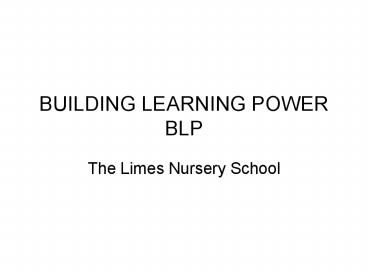BUILDING LEARNING POWER BLP - PowerPoint PPT Presentation
1 / 20
Title:
BUILDING LEARNING POWER BLP
Description:
Our current world is constantly changing ... Our knowledge changes all the time. ... and connecting it to another e.g. My mum has got a saucepan like that at home... – PowerPoint PPT presentation
Number of Views:898
Avg rating:3.0/5.0
Title: BUILDING LEARNING POWER BLP
1
BUILDING LEARNING POWERBLP
- The Limes Nursery School
2
Why is Building Learning Power important?
- Our current world is constantly changing
- Young people need to be able to cope with
complexity, uncertainty and ambiguity. - Our knowledge changes all the time.
- Children and young people need to become aware
of their own learning. - Children can learn to learn
- Children need to be able to overcome obstacles to
their own learning.
3
Why do we need BLP?
- We want young people to have
- the skills and confidence to
- take on challenges and succeed
4
(No Transcript)
5
(No Transcript)
6
(No Transcript)
7
(No Transcript)
8
Resilience
- Absorption Losing themselves in their learning.
E.g. Being entranced by T.V or film, or engrossed
in a game, book or story - Managing Distractions Recognising and reducing
distractions E.g. Recognising the T.V is on too
loud, interfering with reading a story and
switching it off. Or moving away from a noisy
friend when wanting to play quietly and alone. - Noticing Noticing something in the environment
when walking along e.g. leaves falling. Or
recognizing and identifying things e.g. I notice
you are absorbed in that book - Perseverance I can attitude Ill keep
trying Keep getting on the two wheel bike to
practice. Note children learn I cant very
easily especially when comparing self to others
skills e.g. brothers and sisters drawing and
writing.
9
Resoucefulness
- Questioning Encourage children to question
instead of accepting things. E.g. What would
happen if you dont wear your coat to school?- to
ask and try to answer their own questions - Making Links Identifying things from one setting
and connecting it to another e.g. My mum has got
a saucepan like that at home. She does it like
this. - Imagining Exploring possibilities. What would
happen if?.... When reading a book, predicting
the future. What do you think might happen next?
What makes you think that? - Reasoning Rational thinking. If that doesnt
work what else might? E.g. using a computer
logical process!!
10
Reflectiveness
- Planning Think about what they are going to do
next. E.g After my bath I would like to read a
story with you. - Revising Being able to change plans and actions
to cope with the unexpected. E.g. Visitors
arrived during bath time so story is re-planned
for the next day. - Distilling - Reflecting on experiences and
drawing out lessons. E.g. When I didnt wear my
coat to school I got cold. I need to wear my
coat to school so that I can stay warm. - Meta learning Drawing out of your learning
experience a more explicit understanding of the
process of learning. E.g. When I persevere at
learning and practice I can learn anything, like
when I practiced to ride my bike.
11
RECIPROCITY
- Interdependence Understanding and managing the
balance between interacting with others and
learning on their own. E.g. Knowing when they
need to ask for help (doing up shoelace
initially) and knowing when to persevere on their
own (practicing tying their shoelace). - Collaboration- Knowing how to learn with others.
E.g. Being able to work out how to take turns to
share things. - Empathy and listening To really listen to
others and be able to put yourself in someone
elses shoes. E.g. To understand if they snatch
a toy from someone else they may become upset. - Imitation Watching and adopting other peoples
actions, behaviours and habits. E.g. Role
playing cooking in the home area.
12
(No Transcript)
13
Why is BLP important for The Limes?
- The introduction of BLP into a number of Bristol
Schools by the Education Action Zone - This means the Language of learning in BLP will
understood throughout Central Bristol Schools - The familiar BLP language should help children
when moving between schools
14
Why is BLP important for The Limes?
- We have always focused on childrens learning
- BLP is the next step
- As staff we are now focusing childrens attention
on the skills they need to learn and how they
learn.
15
(No Transcript)
16
(No Transcript)
17
How does this involve parents?
- Learning happens everywhere, and all the time,
not just at school. - Parents have a key role in their childrens
learning. - Understanding about BLP is the first step.
18
What can parents do to support their childrens
learning?
- Become aware of themselves as learners
- Share their own learning experiences with their
children - Draw attention to their mistakes and when they
get stuck to re-assure children that this
experience is O.K in learning - Have a positive attitude with childrens learning
E.g. you can do it
19
What can parents do to support their childrens
learning?
- Encourage children to become independent and
confident learners. - Try to allow time for children to make mistakes.
- Becoming familiar with, and using some of the
language of BLP at home would be helpful.
20
What Next?































